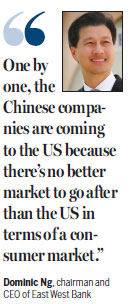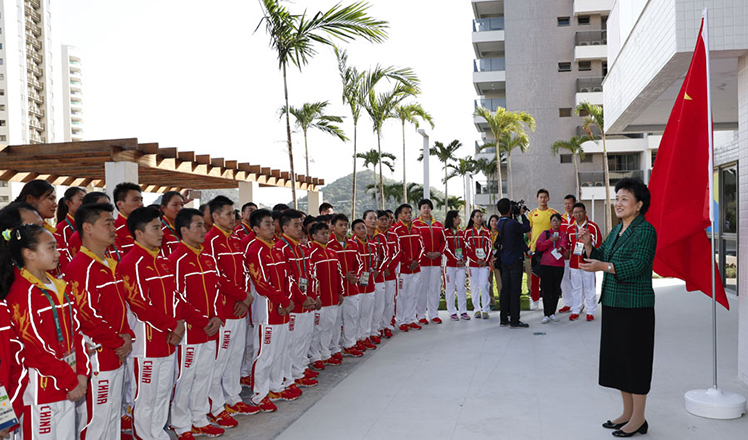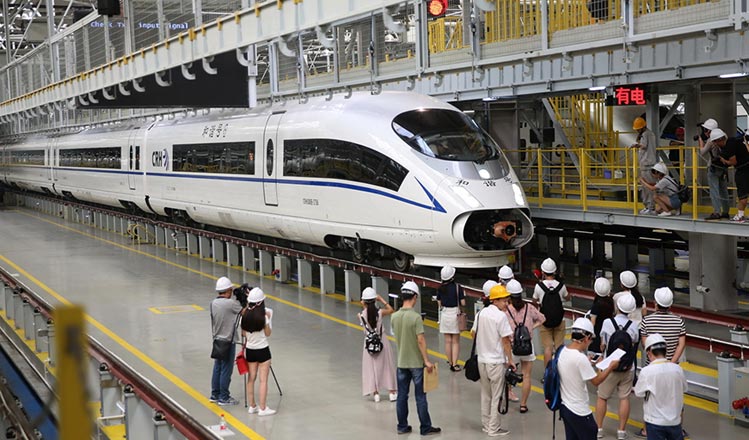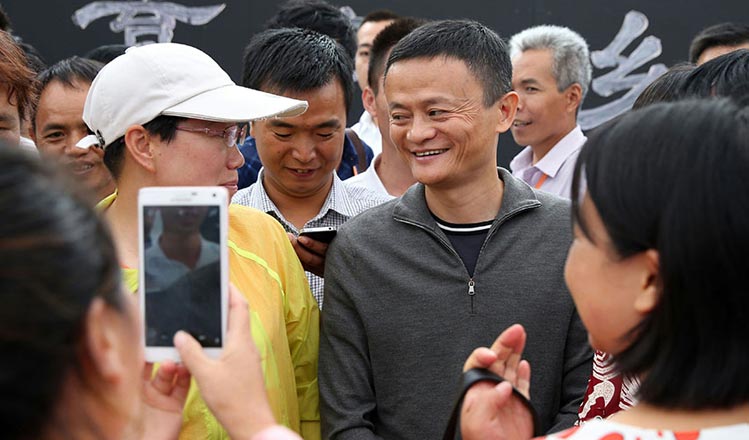Long run seen for China FDI
Updated: 2016-08-05 11:34
By Lia Zhu In San Francisco(China Daily USA)
|
||||||||
The growing trend of Chinese direct investment in the United States will continue for a decade or two despite China's economic slowdown and other political factors, said a California-based banker.

"I'm positive about the continuation of more overseas direct investment coming from China to countries all over the world, most specifically in the United States, because it's a natural direction for an emerging developing country to transition to becoming a developed country," Dominic Ng, chairman and CEO of East West Bank, told China Daily.
Chinese firms invested $18.4 billion in the United States in the first half of 2016, almost three times the amount of the same period last year ($6.4 billion), and more than the total of all of last year ($15.3 billion), according to Rhodium Group.
The increase was largely driven by private sector acquisitions in services, technology and consumer-oriented assets and greenfield projects in real estate and manufacturing, the group said.
Despite concerns that the investment surge was caused by China's slowing economy and currency volatility, Ng said these factors played a role in the short term but were not the primary reason for the growth in FDI.
"I think the vast majority of investments actually make business sense," he said.
The Pasadena, California-based East West Bank has been involved in many of the transactions, such as Perfect World's $250-million investment in a slate of Universal movies.
"We know these Chinese companies are very serious about learning and making their business sustainable through acquisitions, partnerships and collaborations with US companies," said Ng. "They get the know-how and then take the knowledge back to China to further develop their market."
The US is home to technology leaders in many industries, offering Chinese companies the opportunity to acquire firms with cutting-edge technology and to tap the talented and diverse workforce, he said in a recent article posted at the bank's website.
According to Rhodium, more than 80 percent of all Chinese FDI transactions in the US in the first half of 2016 can be characterized as strategic investments, with consumer goods, entertainment, information and communication technology and automotive as the sectors attracting the largest strategic investments.
In light of declining competitiveness in lower-end manufacturing, Chinese companies are also eyeing brand names and other consumer-related assets, Ng said.
"One by one, the Chinese companies are coming to the US because there's no better market to go after than the US in terms of a consumer market," he said. "Chinese consumers are building up their wealth and consumption abilities to buy high-end goods."
The investments in the US allow Chinese companies to increase their ability to serve the fast-growing Chinese middle class with modern services, he added.
"So the economic slowdown will not affect this phenomenon," said Ng. "The GDP may go down to 6 percent someday, or maybe even down to 5 percent, but that will not dramatically slow down the continuation of overseas direct investment, because it's a natural progression China has to go through."
The leadership in China has been consistent about the "going global" policy, and the dramatic reform that China is undergoing will change it from a mainly export-driven economy to a more balanced one focused on both export and import, he said.
The pending M&A transactions add up to more than $23 billion and the value of announced Chinese investments was close to an all-time high of $33 billion at the end of June 2016, according to Rhodium.
As for the risk of China's tightened scrutiny on capital outflow, Ng said it's "healthy" because it makes it harder for capital flight money to come out while the legitimate investment still gets approval.
"There may be more paperwork, more scrutiny, but they (legitimate businesses) are getting the money out," said Ng.
liazhu@chinadailyusa.com
- Nepal's newly elected PM takes oath
- Texas gun law worries incoming students
- China vows to deepen economic, trade cooperation with ASEAN
- Fire guts Emirates jet after hard landing; 1 firefighter dies
- Egypt's Nobel-laureate scientist dies of illness in US
- THAAD muscle flexing unmasks anxiety over declining hegemony

 Big names train for Rio 2016
Big names train for Rio 2016
 Photo exhibition narrates charm of old Beijing
Photo exhibition narrates charm of old Beijing
 Traditional Tibetan handicrafts kept alive in SW China
Traditional Tibetan handicrafts kept alive in SW China
 Chinese Vice Premier visits Olympic delegation
Chinese Vice Premier visits Olympic delegation
 World's fastest bullet train to start operating next month
World's fastest bullet train to start operating next month
 Jack Ma visits rural school, meets teachers
Jack Ma visits rural school, meets teachers
 Top 8 global market leaders from China
Top 8 global market leaders from China
 After Typhoon Nida, torrential rain hits S. China
After Typhoon Nida, torrential rain hits S. China
Most Viewed
Editor's Picks

|

|

|

|

|

|
Today's Top News
US launches airstrikes against IS targets in Libya's Sirte
Ministry slams US-Korean THAAD deployment
Two police officers shot at protest in Dallas
Abe's blame game reveals his policies failing to get results
Ending wildlife trafficking must be policy priority in Asia
Effects of supply-side reform take time to be seen
Chinese State Councilor Yang Jiechi to meet Kerry
Chinese stocks surge on back of MSCI rumors
US Weekly

|

|







